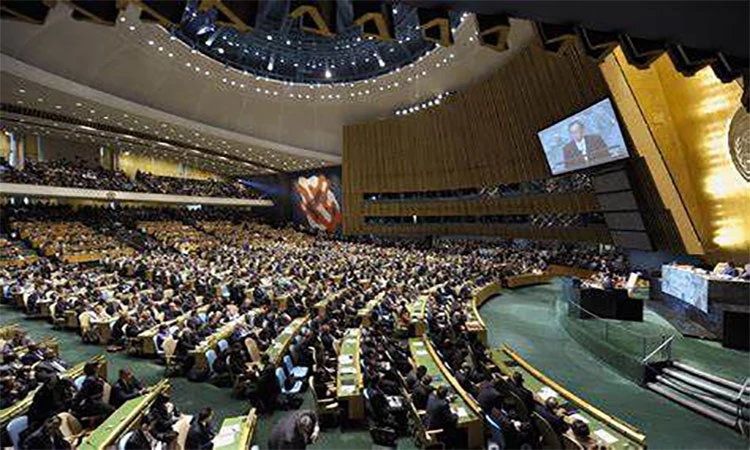One more promise given to Kashmiris at the United Nations

Stay tuned with 24 News HD Android App

The United Nations Third Committee (Social, Humanitarian and Cultural) during its 55th meeting on Friday, approved a draft resolution on the universal realization of the right of peoples to self-determination.
By the text, the Assembly would call on those States responsible to cease military interventions in and occupation of foreign countries and territories, as well as the brutal methods employed against the populations. Under the terms of the draft resolution, the General Assembly would reaffirm the universal realization of the rights of all peoples, including those under colonial, foreign and alien domination, to self-determination as a fundamental condition for the effective guarantee and observance of human rights.
Dr. Ghulam Nabi Fai, Chairman, ‘World Forum for Peace and Justice’ said that “This is one more promise given to the people of occupied lands, including Kashmir that cannot be kept. If promises are made to be broken, then Kashmir may be summoned to prove the treacherous proposition. Broken promises haunt Kashmir’s history and explain its tragedy.
And, if we were to judge the United Nations based upon its history of involvement in efforts to resolve international conflicts, Dr. Fai added, the simplest answer is that it has been an enormous failure. Counted among the greatest failures of the UN are dozens, in particular, Srebrenica, a town in eastern Bosnia; Rwanda; Palestine and Kashmir. In context, Kashmir cannot be ignored, perhaps for no other reason than the conflict there has gone on for 76 years and seems destined to continue as long as the 900,000 Indian military and paramilitary forces continue to occupy the region. The potential for genocide remains a very real threat as warned by Dr. Gregory Stanton, Chairman, Genocide Watch.
“With the lapse of British paramountcy on Aug. 15, 1947, broken promises over Kashmir came not like single spies but in battalions, to borrow from Hamlet. Princely states enjoyed three options: accession to India, accession to Pakistan or independence. But the choice, according to Indian Prime Minister Jawaharlal Nehru and tacitly endorsed by the Mountbatten British Viceroy was to be made by popular referendum in cases where the creed of the ruler varied from the religion of the majority. That promise was never kept,” Fai explained.
India then raced to the United Nations Security Council on Jan.1, 1948, and championed a pair of resolutions on Aug. 13, 1948, and Jan. 5, 1949, that prescribed a self-determination vote for Kashmiris on the heels of U.N. supervised demilitarization. That promise was also broken.
Promises were made by India in 1966, (Tashkent Declaration), 1972, (Shimla Agreement) to negotiate seriously over Kashmiri’ssovereignty. But nothing was done. One more broken promise can be laid at the feet of the UN Security Council which has never exerted any moral or other clout to even nudge India toward compliance with its resolutions.
The train of broken promises over Kashmir might be forgiven if the consequences were innocuous or inconsequential. But I submit the opposite is the case. India exerts an iron-fisted rule over Kashmir that would stir the heart of Genghis Khan.
Fai expressed frustration at the lack of initiative at the United Nations. It seems that the UN Security Council has honoured India’s indefensible defence of its Kashmir broken promises because of its muscular military, nuclear and economic profile and hegemony in South Asia.
Now, listen to Ambassador A. Gopinathan, Deputy Permanent Representative of India to the United Nations who said at the Third Committee that,” India is fully committed to the universal realisation of the right of peoples to self-determination as enshrined in the Charter of the United Nations and the international Covenants on human rights, as well as in the Declaration on the Granting of Independence to Colonial Countries and Peoples contained in General Assembly resolution 1514 of 14 December 1960.”
All was going well so far. Then suddenly, Ambassador Gopinathan realised that he could not win the hearts and minds of the people of Kashmir if they were given the right to self-determination. Recognizing that the people of Kashmir would never freely vote for accession to India, he contrived an excuse, and said, “In today’s world self-determination implies the right of participation in freely-held elections by all sections of society.”
Finally, Dr. Fai suggested that it is high time that the United Nations try to make a constructive departure. The best point for doing so is to restore the focus where it originally belonged and where it still rests logically viz: the rights and interests of the people of all zones of the State of Jammu & Kashmir itself. No sleight of hand is required, no subtle concepts are to be deployed, and no ingenious deal needs to be struck between India and Pakistan. What is needed is going back --- yes, going back --- to the point of agreement which historically existed beyond doubt between India and Pakistan and jointly resolving to retrieve it with such modifications as proposed by the Kashmir leadership – the tripartite negotiations between India, Pakistan and the genuine leadership of the people of the State of Jammu & Kashmir.
